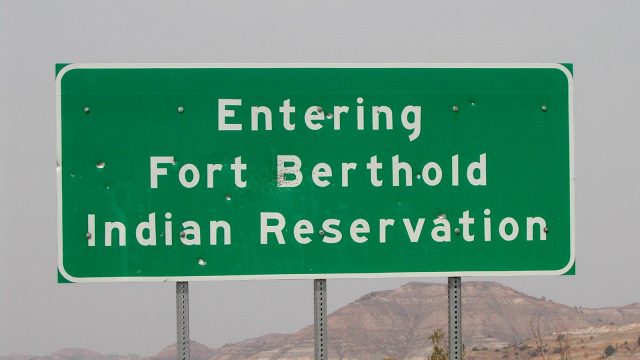Fort Berthold Tribes Say They'll Stay In Oil Tax Agreement With The State For Now

The Three Affiliated Tribes of the Fort Berthold Indian Reservation have been expressing some consternation for some time now over the oil tax reforms passed by state lawmakers earlier this year.
The legislature replaced a massive oil tax cut triggered by low oil prices with modest reforms to the tax rate. Starting on January 1 2016 the state’s combined oil production and extraction taxes will be 10 percent under $90 per barrel. Over $90 per barrel the rate will be 11 percent.
This matters because, beyond the fact that about 20 percent of the state’s oil output comes from that reservation, the state and the tribes are in a tax agreement which has the state sharing some of its oil tax revenues in exchange for the tribe letting the state apply its tax policies to oil development on the reservation.
Prior to the agreement there was a dual taxing regime – state and tribal – and pretty much zero oil development happening on the reservation because of it. The agreement simplified the tax code, and opened the door to development.
The tribe has benefitted greatly from the agreement. As it stands, the tribe is currently getting approximately $10 million per month in oil tax revenues. While that’s down from the $25 million per-month windfall the tribe was enjoying during the peak of the boom, it’s significantly higher thanks the elimination of the oil tax trigger which would likely have pushed the monthly tribal take down below $5 million per month.
But, in what is an absolutely perplexing development as I’ve noted previously, the tribes are upset that the overall tax rate was reduced. Tribal chairman Mark Fox has been playing chicken with the state over withdrawing from the tax agreement, but today he blinked.
[mks_pullquote align=”right” width=”300″ size=”24″ bg_color=”#ffffff” txt_color=”#000000″]”The current position of the MHA Nation is to take no formal action at this time concerning the oil and gas tax agreement while negotiations with the Governor’s Office continue,” Fox said in a statement released by the tribe this afternoon.[/mks_pullquote]
“The current position of the MHA Nation is to take no formal action at this time concerning the oil and gas tax agreement while negotiations with the Governor’s Office continue,” Fox said in a statement released by the tribe this afternoon.
You can read the whole thing below, including Fox accusing the state of breaking the agreement by making changes to the tax rates: “The changes made by the State at the last legislative session did not have approval by the tribal government, and those legislative actions were in contradiction to the terms of the tax agreement which say neither party will adjust, raise or lower the production and extraction taxes on oil and gas activities within the exterior boundaries of the Fort Berthold Reservation during the term of the Agreement.”
I’m not sure that’s accurate. The agreement, which you can read here, does include the language Fox alludes to, but I’m not sure the language has merit.
Ask yourselves this: How can one governor or legislature enter the state into a perpetual tax agreement (note that there’s no expiration date) which prohibits the legislature from ever making changes to the tax policy covered by the agreement? Or, more specifically, gives an entity outside of the state government veto power over future legislative actions.
Can the state sign an agreement with the North Dakota Petroleum Council giving that group and the industry it represents veto power over oil tax and development policy? Or should we agree that it’s an absurd idea?
The problem seems to be that the tribes want an enforceable part of the agreement the signed up for enforced.
(Note that the tribal representative who signed the agreement was Heidi Heitkamp crony Tex Hall).
Wat’s crazy is that the tribes seem to want it enforced to their detriment. The impact on the tribes had the state not reformed the oil tax code would have been enormous. They’d have lost millions upon millions in revenues.
Is that really what Chairman Fox wants? I doubt it.
Actions speak louder than words. Fox is sticking with the deal because once you get past the political bluster he knows it’s good reform. Plus, the alternative is going back to a dual taxing regime which likely means the departure of oil activity from the reservation.
In his statement Fox calls impact of oil development on the reservation “overwhelming and negative,” which is just laughable. If Fox really believed that they’d happily withdraw from the tax agreement.
He doesn’t. What he really wants is a larger slice of the tax pie.




